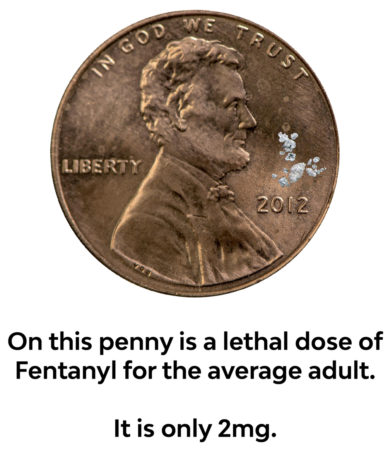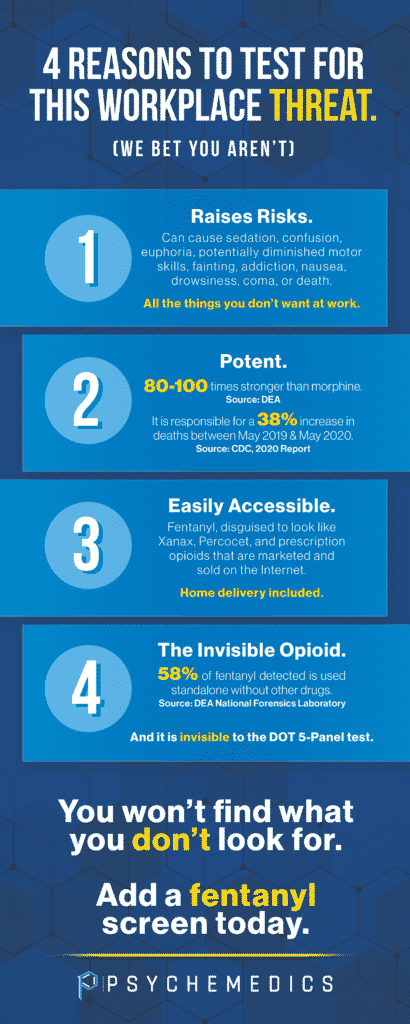WHY ADD FENTANYL TO YOUR DRUG TESTING REGIMEN?
It is Available, Accessible and Deadly.
And it is completely invisible to a standard 5-Panel drug test.
What Is Fentanyl?
Descriptions
Fentanyl is a synthetic opioid and prescription drug with analgesic and anesthetic properties similar to morphine. It was developed in 1960 and widely used under medical supervision. Like morphine, it is a medicine that is typically used to treat patients with severe pain, especially after surgery. Where patients may have chronic pain and resistance to other opioids it is sometimes used therapeutically. Let the fentanyl hair drug testing experts at Psychemedics prevent your organization from employing fentanyl abusers.
The National Institute on Drug Abuse (NIDA) warns that fentanyl is 50-100 times more powerful than morphine with similar strength differential over heroin.
Analyte
Fentanyl
Street Names / Slang Terms
Apache, China Girl, China White, Dance Fever, Friend, Goodfellas, Jackpot, Murder 8, Tango & Cash
Test for fentanyl today!
Fentanyl brings all the risks to your workplace as other opioids but it is completely invisible to your 5-panel test. It is plentiful, easily accessible and a real threat to workplace safety. If you don't look for it, you won't find it. Simple as that. Find out more now!
What Does Fentanyl Look Like?
Crystals or crystalline powder. But rarely seen in that form when it is distributed illicitly.
With Illicitly Manufactured Fentanyl (IMF), recreational or habitual drug users can never be sure when they are being exposed as it is often cut into heroin or cocaine to be injected or snorted, increasingly manufactured into counterfeit versions of so-called “party drugs” such as Xanax or Percocet. Opioids users are not safe either with a number of deaths caused by fentanyl disguised as that class of drugs. With fentanyl showing up in, or masquerading as, so many drugs-of-abuse recreational or habitual users are exposed to a deadly threat without ever knowing.
How/What is Fentanyl Used For?
When cut into heroin or cocaine by illicit drug manufacturers and distributors it is injected or inhaled (snorted).
Counterfeit pill manufacturers distribute fentanyl disguised as prescribed medications, notably Xanax, Percocet and Opioids.
How Lethal Is Fentanyl?
- Fentanyl is 50-100 times more potent than morphine. (DEA)
- Fentanyl deaths were up 1100% between 2013 and 2019. (CDC)
- In 2020, the DEA Houston Division seized over 6X the amount of fentanyl as in 2019–enough to kill half the U.S. population. (DEA)
- Well over 50% of detected fentanyl is where it is the only drug ingested, meaning it will go undetected by a 5-panel drug screen. (NFLIS)
“Synthetic opioids (primarily illicitly manufactured fentanyl) appear to be the primary driver of the increases in overdose deaths, increasing 38.4 percent from the 12-month period leading up to June 2019 compared with the 12-month period leading up to May 2020.”
Centers for Disease Control (CDC)



A Psychemedics test for fentanyl using hair analysis may be an add-on to a standard panel, or run as a standalone test.
In either case, each Psychemedics screen is FDA 510K-cleared and virtually cheat-proof.
Why choose Psychemedics for Fentanyl Hair Drug Testing?
Psychemedics enjoys a long legacy of developing and delivering more FDA-approved drug screens to take on the most significant challenges today than any hair testing lab. Fentanyl is killing thousands each quarter, and is a public health threat that threatens every workplace and campus.
For many recreational drugs, we say “Certainty of Detection is the Best Deterrence”. In the case of Fentanyl, a drug user may not know they are being exposed to the drug. Detecting fentanyl in a pre-employment or random drug test may literally be saving the life of someone who is being exposed inadvertently.
Large and small companies, private, public and faith-based schools and some of the country’s largest law enforcement agencies rely on Psychemedics to create drug-free workplaces and campuses. Why?
Unrivaled Detection. Unmatched Deterrence. Unequaled Legal Record.
Our non-invasive testing procedure uses a sample of hair that is up to 60% less than that required by any fentanyl hair drug testing lab which is easily collected and shipped to our College of American Pathologists (CAP) and ISO-IEC 17025:2005 certified laboratory. Turnaround on most results is the best in the industry.
Psychemedics has detected more drug users for more companies than any other fentanyl hair drug testing lab in the world — and our results have been accepted by courts across the country. Contributing to our unmatched legal track record, it is the only hair test with safeguards validated by the FBI to protect those tested from false positive results by differentiating between ingestion versus external exposure to a drug. Our clients confidently make policy decisions knowing that we go the extra mile to ensure fairness to those tested.
Only Psychemedics brings the surety and validation that an FDA clearance provides to a fentanyl hair drug test.
Fast Facts. What is Fentanyl?
Keep Current On What is Fentanyl Drugs Of Abuse
We have put together an information sheet on Fentanyl Hair Drug Testing to help you understand the threats and recognize the symptoms of inadvertent exposure or abuse. You can download the document for your reference or to share with others who may benefit from the information we have shared.

More Information About Fentanyl
Short Term Effects
Like heroin, morphine, and other opioid drugs, fentanyl works by binding to the body’s opioid receptors, which are found in areas of the brain that control pain and emotions. According to Medical News Today, the difference between a therapeutic dose and a deadly dose of fentanyl is very small. In fact, according to the same source oral formulations of fentanyl contain an amount of the drug that can be fatal to a child.
Fentanyl use can result in accidental death even with just one dose, especially common in cases where it is taken unknowingly after being cut into a more mainstream recreational drug or manufactured as a counterfeit pill. Given the drug’s heavy sedative effect breathing can slow or stop. A condition called hypoxia in which the brain is starved for oxygen can occur. Hypoxia can lead to a coma, brain damage that can be severe and permanent, or death.
Signs of an overdose include:
- general slowing of respiration including heart rate and breathing
- trouble walking or talking
- faintness and/or confusion
- severe sleepiness
- cold, clammy skin
- unresponsiveness or unconsciousness
Although overdose may be treated through administration of naloxone, in a moderate to severe overdose coma and death can occur in minutes.
Long Term Effects: Addiction and Withdrawal
After taking opioids many times, the brain adapts to the drug, diminishing its sensitivity, making it hard to feel pleasure from anything besides the drug. As with any addiction, drug seeking and drug use takes over lives.
According to the National Institute on Drug Abuse, addiction is a severe long term side effect of fentanyl use, primarily because withdrawal is difficult. Withdrawal symptoms can begin as soon as a few hours after last use of the drug. This presents particularly daunting problems for people who have been exposed unknowingly and become addicted in the process.
Symptoms of withdrawals include:
- muscle and bone pain
- sleep problems
- diarrhea and vomiting
- cold flashes with goose bumps
- uncontrollable leg movements
- severe cravings
NIDA reports there are medicines being developed to help ease withdrawal from fentanyl and the FDA has approved lofexidine, a non-opioid medicine designed to reduce opioid withdrawal symptoms.
Counterfeit pills and fentanyl
Synthetic opioids (primarily illicitly manufactured fentanyl) appear to be the primary driver of the increases in overdose deaths, increasing 38.4 percent from the 12-month period leading up to June 2019 compared with the 12-month period leading up to May 2020.
Can you spot the three people in this crowd who don’t know they were exposed to fentanyl?
Psychemedics can.
Protect your workplace. Save a life.
The Psychemedics Advantage
Your objective is a drug-free workplace.
Your challenge is to Detect and Deter every drug user.
Unrivaled Detection. Unmatched Deterrence.
That is the Psychemedics Advantage.
Drug News You Can Use
Sign up for our quarterly newsletter to stay up-to-date with snapshots of usage statistics, information on the latest trends, and updates on detection science.



